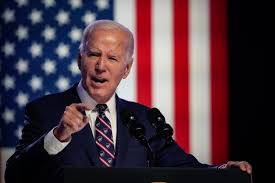**Biden Blocks Nippon Steel's Bid to Acquire US Steel, Citing National Security Concerns**
In a move underscoring growing economic and geopolitical tensions, President Joe Biden has blocked Japan’s Nippon Steel from acquiring US Steel, citing potential risks to national security. The decision, issued through an executive order, comes at a time when the United States is carefully guarding its critical industries amid concerns over global competition and supply chain vulnerabilities.
The proposed deal, which was estimated to be worth billions, would have marked one of the most significant cross-border acquisitions in the steel industry. However, Biden’s administration has made it clear that certain sectors, particularly those tied to infrastructure and defense, must remain under American control.
---
### **Details of the Proposed Deal**
Nippon Steel, one of the world’s largest steelmakers, had been in discussions to acquire a majority stake in US Steel, a Pittsburgh-based company with a storied history dating back to 1901. US Steel has long been a cornerstone of America’s industrial backbone, supplying critical materials for construction, transportation, and defense.
The deal was seen as a strategic move by Nippon Steel to expand its presence in North America, capitalizing on growing demand for high-grade steel in the region. For US Steel, the acquisition would have provided much-needed capital and access to advanced technologies.
However, the transaction faced scrutiny from the Committee on Foreign Investment in the United States (CFIUS), an inter-agency body tasked with reviewing foreign investments for potential national security risks. After months of deliberation, the Biden administration decided to block the deal, citing concerns over the strategic importance of the steel industry.
---
### **National Security Concerns**
The Biden administration’s decision highlights the increasing importance of domestic control over critical industries. Steel production is not only vital for infrastructure projects like bridges, roads, and buildings but also plays a crucial role in national defense.
A senior White House official stated, “Allowing a foreign entity to control US Steel could have compromised our ability to meet national security needs, including the supply of materials for military equipment and critical infrastructure.â€
The decision also reflects broader concerns about reliance on foreign companies in key sectors. While Japan is a close ally of the United States, the administration is wary of foreign ownership that could lead to shifts in production priorities or the potential transfer of sensitive technologies.
---
### **Implications for the Steel Industry**
Blocking the acquisition has significant implications for both Nippon Steel and US Steel.
For Nippon Steel, the decision is a major setback in its efforts to expand its global footprint. The company has been seeking to diversify its operations as it faces stiff competition from Chinese and South Korean steelmakers. The failed bid for US Steel underscores the challenges of navigating regulatory hurdles in international markets.
For US Steel, the decision means the company will need to explore alternative ways to address its financial and operational challenges. The American steelmaker has been struggling with declining demand and aging infrastructure, prompting calls for modernization and strategic partnerships.
However, the Biden administration has pledged to support domestic industries, including steel, as part of its broader strategy to revitalize American manufacturing. Initiatives like the Inflation Reduction Act and the Bipartisan Infrastructure Law are expected to provide significant funding for infrastructure projects, potentially boosting demand for US-made steel.
---
### **Geopolitical and Economic Context**
The decision to block Nippon Steel’s bid comes against the backdrop of intensifying global competition and economic nationalism. The steel industry has become a focal point in trade disputes, with countries imposing tariffs and other measures to protect their domestic producers.
The United States has previously clashed with Japan and other countries over steel imports, accusing them of unfair trade practices. While relations between Washington and Tokyo remain strong, the blocked acquisition highlights the complexities of balancing economic cooperation with national security concerns.
China’s dominance in the global steel market has further heightened tensions. Beijing’s state-subsidized steelmakers have been accused of flooding the market with cheap products, undermining competitors in the US and other countries. By keeping US Steel under American control, the Biden administration aims to strengthen domestic production and reduce reliance on foreign suppliers.
---
### **Reactions from Stakeholders**
The decision has drawn mixed reactions from industry stakeholders, policymakers, and analysts.
Nippon Steel expressed disappointment but reiterated its commitment to growth in the North American market. In a statement, the company said, “While we respect the decision of the US government, we remain committed to pursuing opportunities that align with our long-term strategic goals.â€
US Steel welcomed the government’s support but acknowledged the challenges ahead. “We appreciate the administration’s recognition of the critical role US Steel plays in national security. We remain focused on strengthening our operations and serving our customers,†the company said.
Critics of the decision argue that it could deter foreign investment in the United States, potentially harming economic growth. “Blocking this deal sets a concerning precedent,†said one industry expert. “While national security is important, we need to ensure that protectionism doesn’t stifle innovation and global partnerships.â€
---
### **Conclusion**
President Biden’s decision to block Nippon Steel’s bid for US Steel underscores the growing emphasis on safeguarding critical industries in an era of geopolitical uncertainty. While the move aims to protect national security, it also raises questions about the balance between economic openness and strategic autonomy.
As the global steel industry continues to evolve, the United States will need to navigate these challenges carefully, ensuring that domestic producers remain competitive while fostering collaboration with international partners. For now, US Steel remains firmly under American control, reflecting the administration’s commitment to prioritizing national interests.



No comments yet
Be the first to share your thoughts!